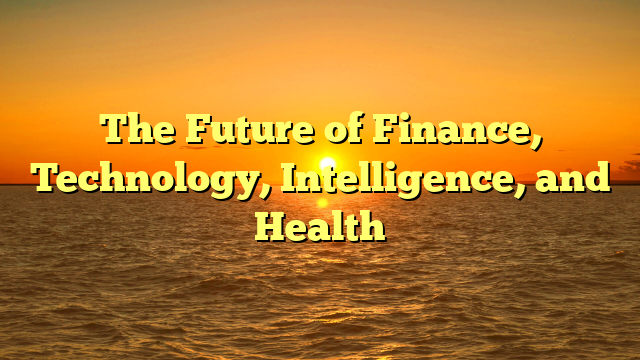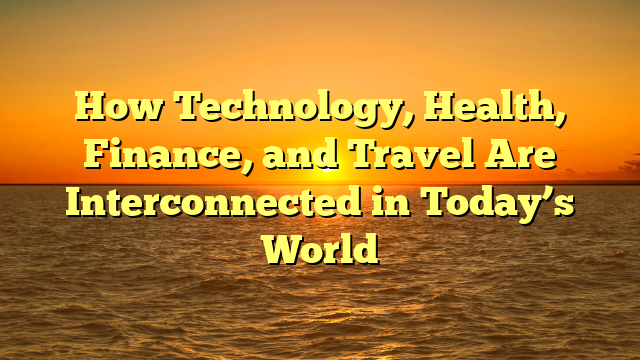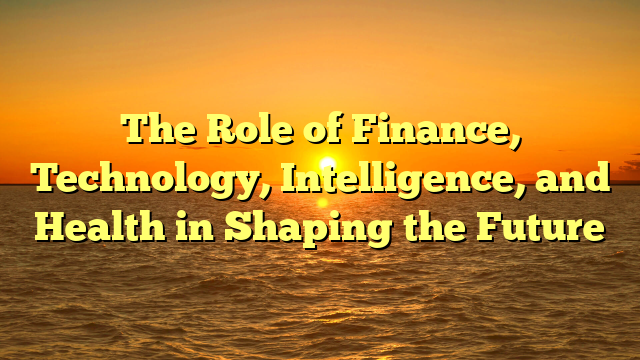The world is evolving rapidly, and the integration of technology, finance, artificial intelligence, and healthcare is playing a crucial role in shaping the future. In this article, we will explore how these fields intersect, their impact on society, and the potential they hold for a brighter future.
The financial landscape is constantly changing, driven by new technological advancements and a deeper understanding of human intelligence. In particular, artificial intelligence (AI) is revolutionizing the way financial services are provided, while health technology innovations are transforming the healthcare industry. Let’s take a closer look at how these areas are influencing each other and creating a new era of progress.
—
Finance and Technology: The Digital Revolution in Banking
The integration of technology in finance has led to what many call the “digital revolution” in banking. The rise of digital banking platforms, cryptocurrency, and fintech companies has fundamentally changed the way we manage our money. The advent of blockchain technology, for instance, has brought about decentralized financial systems that reduce the need for intermediaries. This not only lowers costs but also makes transactions more secure and transparent.
Digital payments, mobile banking apps, and peer-to-peer lending platforms are changing the way we conduct financial transactions. These technologies provide greater accessibility, particularly in underserved regions where traditional banking services are limited. Additionally, the introduction of robo-advisors is making financial planning and investment more accessible to a wider audience, allowing individuals to make informed decisions without needing a financial advisor.
Blockchain and cryptocurrency, in particular, are two technologies that have gained significant attention in recent years. Cryptocurrencies like Bitcoin and Ethereum are disrupting traditional banking systems, offering people a way to store and transfer money without the need for banks. Blockchain, the underlying technology behind cryptocurrencies, offers a decentralized and secure way of recording transactions, making it a powerful tool in both the financial and healthcare sectors.
—
Artificial Intelligence and Finance: Smarter Decisions, Faster Transactions
Artificial intelligence (AI) is enhancing decision-making processes in the finance industry. By analyzing vast amounts of data at lightning speed, AI can identify patterns and trends that human analysts might miss. This capability allows financial institutions to make smarter decisions regarding investments, risk management, and customer service.
For example, AI-powered algorithms are now being used to predict stock market trends and to identify the best investment opportunities. samosir88 learning models can analyze historical data and market signals, providing traders with a competitive edge. Furthermore, AI is improving customer service by automating tasks like fraud detection, loan approval processes, and personalized recommendations.
In terms of speed, AI is also making transactions faster and more efficient. With AI-driven systems, financial institutions can process a larger volume of transactions in less time, reducing wait times for customers and increasing overall efficiency. This is particularly beneficial in high-frequency trading, where speed is crucial to profitability.
—
Technology and Healthcare: Revolutionizing Medical Care
Technology is also making waves in the healthcare sector. From telemedicine to wearable health devices, innovations in technology are transforming how healthcare is delivered. Telemedicine allows patients to consult with healthcare providers remotely, reducing the need for in-person visits and making healthcare more accessible, especially in rural areas.
Wearable devices, such as fitness trackers and smartwatches, are providing individuals with real-time insights into their health, allowing them to monitor vital signs and physical activity. This data is valuable not only for individuals but also for healthcare providers, who can use it to create personalized treatment plans. Furthermore, AI-driven diagnostic tools are helping doctors make faster and more accurate diagnoses, leading to better patient outcomes.
One of the most promising developments in healthcare is the use of AI and machine learning to analyze medical data. By processing vast amounts of patient records, AI can identify early signs of diseases such as cancer, diabetes, and heart conditions. This allows for earlier intervention and better preventative care. Furthermore, AI is being used in drug discovery, speeding up the process of developing new treatments and therapies.
—
Intelligence and Health: Cognitive Wellness in the Digital Age
Intelligence is not only about raw cognitive power but also about how we use technology to enhance our mental health and well-being. In the digital age, maintaining cognitive wellness is just as important as physical health. Advances in neuroscience and psychology, combined with technology, are helping individuals improve their mental health and cognitive abilities.
For example, brain-computer interfaces (BCIs) are being developed to help individuals with neurological disorders, such as paralysis, regain movement control. These devices work by reading brain signals and translating them into commands that control external devices like prosthetics. This innovation has the potential to vastly improve the quality of life for individuals with severe disabilities.
In addition to BCIs, AI-powered mental health apps are helping people manage stress, anxiety, and depression. These apps use machine learning algorithms to provide personalized recommendations for mental wellness, such as relaxation exercises, cognitive behavioral therapy techniques, and mindfulness practices. By offering real-time support, these technologies can help individuals take proactive steps toward improving their mental health.
—
The Intersection of Finance, Technology, Intelligence, and Health
As we can see, finance, technology, intelligence, and health are all interwoven in today’s world. The advancements in AI, blockchain, and wearable technologies are not only improving the financial and healthcare sectors but also contributing to the enhancement of human intelligence and cognitive well-being.
For example, financial services companies are increasingly using AI to improve healthcare accessibility by investing in health technology startups. Meanwhile, health-tech companies are leveraging blockchain technology to ensure the privacy and security of patient data. The synergy between these fields is creating opportunities for cross-sector collaboration, ultimately benefiting society as a whole.
Looking ahead, the future of finance, technology, intelligence, and health seems promising. With continued advancements in AI, blockchain, and wearable health devices, we can expect a world where people have greater control over their financial and health outcomes. These innovations will not only improve individual lives but also foster a more inclusive and sustainable society.
—
In conclusion, the integration of finance, technology, intelligence, and health is paving the way for a more interconnected and efficient world. As these fields continue to evolve, they will undoubtedly reshape industries, improve lives, and create new opportunities for individuals and communities alike. The future holds great potential, and we are only beginning to scratch the surface of what these innovations can achieve.
The key to harnessing the full potential of these sectors lies in collaboration. By fostering partnerships between financial institutions, healthcare providers, tech companies, and researchers, we can unlock new solutions that address the most pressing challenges of our time. Together, we can create a future where technology empowers individuals to lead healthier, more prosperous lives.
The Future of Finance, Technology, Intelligence, and Health


